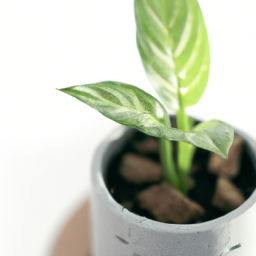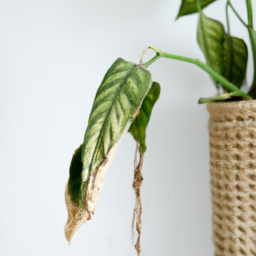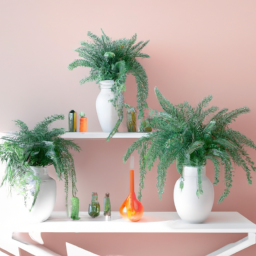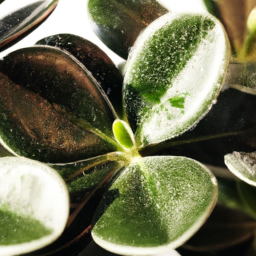
Have you ever wondered, “Can indoor plants make you sick?” It’s a common question among plant enthusiasts and those looking to improve their indoor air quality. While indoor plants offer numerous benefits, such as purifying the air and reducing stress, they can also potentially cause health issues if not properly cared for. In this blog post, we will explore the potential risks associated with indoor plants and how you can mitigate them to enjoy the many benefits of having greenery in your home.
Risks of Indoor Plants: Understanding How Indoor Plants Can Make You Sick
Introduction
Indoor plants are a common sight in many homes and offices. They are known for their ability to purify the air and add a touch of greenery to indoor spaces. However, what many people don’t realize is that indoor plants can also pose health risks if not properly cared for. In this article, we will explore the potential ways in which indoor plants can make you sick and how to mitigate these risks.
Potential Health Risks
One of the main ways in which indoor plants can make you sick is through the accumulation of mold and bacteria in the soil. Overwatering plants can create a damp environment that is conducive to the growth of mold and bacteria. When these microorganisms are present in high concentrations, they can release spores and toxins into the air, which can cause respiratory problems and other health issues.
In addition, some indoor plants are known to release volatile organic compounds (VOCs) into the air. These compounds can cause irritation to the eyes, nose, and throat, as well as headaches and dizziness. Common indoor plants that are known to release VOCs include peace lilies, snake plants, and rubber plants. While the levels of VOCs released by indoor plants are generally low, prolonged exposure can still have negative effects on your health.
Furthermore, some indoor plants can attract pests such as mites, aphids, and fungus gnats. These pests can not only damage the plants themselves but can also pose health risks to humans. For example, mites can cause skin irritation and allergic reactions, while fungus gnats can carry pathogens that can cause infections. It is important to regularly inspect your indoor plants for signs of pest infestations and take appropriate measures to control them.
Preventing Health Risks
To minimize the health risks associated with indoor plants, it is important to practice good plant care habits. Avoid overwatering your plants and ensure that they are placed in well-draining pots to prevent the buildup of mold and bacteria in the soil. Use a moisture meter to monitor the soil moisture levels and only water your plants when necessary.
In addition, choose indoor plants that are known to be low in VOC emissions, such as spider plants, Boston ferns, and aloe vera. These plants can help improve indoor air quality without releasing harmful compounds into the air. It is also a good idea to regularly ventilate your indoor spaces to allow for the circulation of fresh air and the removal of any airborne pollutants.
Lastly, inspect your indoor plants regularly for signs of pest infestations and take prompt action to control them. This may involve using natural pest control methods such as neem oil or introducing beneficial insects that can help keep pest populations in check. By taking these preventive measures, you can enjoy the benefits of indoor plants without putting your health at risk.
In conclusion, while indoor plants can offer numerous benefits, it is important to be aware of the potential health risks they pose. By understanding how indoor plants can make you sick and taking proactive steps to mitigate these risks, you can create a healthy and safe indoor environment for both yourself and your plants.

Common Indoor Plant Allergies and Health Concerns to Be Aware Of
Introduction
Indoor plants are a great way to bring a touch of nature into your home or office. However, some people may experience allergies or other health concerns when exposed to certain indoor plants. In this article, we will explore some of the common indoor plant allergies and health concerns that you should be aware of.
Allergies
Indoor plants can trigger allergies in some individuals, particularly those who are sensitive to pollen or have asthma. Common symptoms of indoor plant allergies include sneezing, runny nose, itchy eyes, and skin rashes. If you notice these symptoms when you are around indoor plants, it is important to identify the specific plant that is causing the reaction and remove it from your space.
Some indoor plants are more likely to trigger allergies than others. Plants such as ragweed, juniper, and chamomile are known to produce pollen that can cause allergic reactions. If you are prone to allergies, it is best to avoid these plants and opt for hypoallergenic varieties instead.
In addition to pollen, indoor plants can also harbor mold spores, which can exacerbate allergies in some individuals. To minimize mold growth, make sure to water your plants sparingly and provide adequate ventilation in your space.
Health Concerns
In addition to allergies, indoor plants can also pose other health concerns. Some plants, such as the peace lily and philodendron, are toxic if ingested. If you have young children or pets in your home, it is important to keep these plants out of reach to prevent accidental poisoning.
Another health concern associated with indoor plants is the presence of pests such as spider mites and aphids. These pests can damage your plants and may also trigger allergic reactions in some individuals. To prevent pest infestations, regularly inspect your plants for signs of infestation and take appropriate measures to control the pests.
Furthermore, some indoor plants release volatile organic compounds (VOCs) into the air, which can cause respiratory irritation and other health problems. Plants such as rubber trees and snake plants are known to release VOCs, so it is important to choose plants that have air-purifying properties and emit minimal VOCs.
In conclusion, while indoor plants offer numerous benefits, it is important to be aware of the potential allergies and health concerns associated with certain plants. By selecting hypoallergenic varieties, practicing proper plant care, and being mindful of toxic plants and pests, you can enjoy the beauty of indoor plants without compromising your health.

Can Indoor Plants Make You Sick?
Understanding the Risks of Indoor Plants
Indoor plants are a common feature in many homes and offices, prized for their ability to purify the air and add a touch of nature to indoor spaces. However, some people may be concerned about the potential health risks associated with indoor plants. While indoor plants can provide numerous benefits, it is important to be aware of the potential risks they may pose to your health.
One of the main concerns with indoor plants is the potential for mold and mildew growth. Indoor plants require regular watering, which can create a moist environment that is conducive to mold and mildew growth. Mold spores can be released into the air, leading to respiratory issues and other health problems for sensitive individuals. Additionally, overwatering indoor plants can lead to root rot, which can release harmful bacteria into the air.
Another potential risk of indoor plants is the presence of allergens. Pollen, dust, and other allergens can collect on indoor plant leaves, leading to allergic reactions in sensitive individuals. Additionally, some indoor plants can produce volatile organic compounds (VOCs), which can cause respiratory issues and other health problems in some people.
Steps to Minimize Health Risks from Indoor Plants
To minimize the potential health risks associated with indoor plants, there are several steps you can take to create a healthy indoor environment:
1. Choose the Right Plants: Some indoor plants are less likely to cause health issues than others. Opt for plants that are known for their air-purifying properties, such as spider plants, peace lilies, and snake plants. These plants can help improve indoor air quality without posing significant health risks.
2. Proper Plant Care: Proper plant care is essential for maintaining a healthy indoor environment. Avoid overwatering indoor plants, as this can lead to mold growth and root rot. Ensure that your plants are placed in well-draining pots and receive adequate sunlight and airflow to prevent the buildup of mold and allergens.
3. Regular Cleaning: Regularly clean your indoor plants to remove dust, pollen, and other allergens that may collect on their leaves. Wipe down plant leaves with a damp cloth or give your plants a gentle shower to remove dust and debris. This can help reduce the risk of allergic reactions and respiratory issues.
By following these tips, you can enjoy the benefits of indoor plants while minimizing the potential health risks they may pose. Creating a healthy indoor environment with the right plants and proper care can help ensure that your indoor plants enhance your space without making you sick.
Key Takeaways of this article
Many people love having indoor plants in their homes for their aesthetic appeal and air-purifying qualities. However, there is a common concern about whether these plants can actually make you sick. The truth is, while indoor plants can offer numerous benefits, they can also potentially cause health issues if not properly cared for.
One of the main reasons indoor plants can make you sick is due to mold growth. Overwatering or poor drainage can lead to excess moisture in the soil, creating a breeding ground for mold spores. These spores can then be released into the air, triggering allergic reactions or respiratory problems in some individuals. Additionally, some plants can also produce pollen or volatile organic compounds that may irritate those with allergies or sensitivities. To prevent these issues, it’s important to properly care for your indoor plants by ensuring they have adequate drainage, avoiding overwatering, and regularly cleaning their leaves to prevent dust buildup. By taking these precautions, you can enjoy the benefits of indoor plants without risking your health.
FAQ Compilation:
Q1: Can indoor plants make you sick?
A1: While indoor plants can improve air quality by removing toxins, some people may experience allergies or respiratory issues from mold spores or pollen released by plants.
Q2: How can indoor plants affect indoor air quality?
A2: Indoor plants can help remove toxins like formaldehyde and benzene from the air through a process called phytoremediation, which can improve air quality and overall health.
Q3: Are there specific plants that are more likely to cause allergies?
A3: Yes, plants like mold-prone ferns, pollen-producing flowers, and plants with sap that can irritate the skin are more likely to trigger allergies or respiratory issues in sensitive individuals.
Q4: How can I minimize the risk of getting sick from indoor plants?
A4: To minimize the risk of getting sick from indoor plants, make sure to choose plants that are less likely to trigger allergies, keep plants well-ventilated, and regularly clean leaves to prevent mold growth.
Q5: Should I avoid having indoor plants if I have allergies?
A5: If you have allergies, it’s best to choose plants that are less likely to trigger allergic reactions and to keep them well-maintained to minimize the risk of getting sick from indoor plants.
Dr. Olivia Green is a botanist with over two decades of experience in indoor plant cultivation. She holds a Ph.D. in Plant Biology and has dedicated her career to researching plant behavior in controlled environments. Dr. Green is passionate about helping plant enthusiasts master the art of indoor gardening through her extensive knowledge and practical insights.


